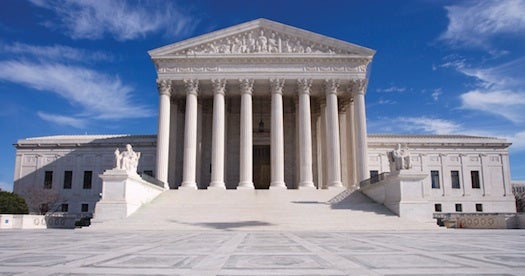Should Companies Be Able To Patent Genes?
Opponents to gene patenting have lost their case in courts before, but they're now trying the U.S. Supreme Court.

The U.S. Supreme Court heard a case today that may sound a bit like old news. The highest court in the land considered whether genes are patentable.
You’ve probably heard of these arguments—and even of the genes in question, BRCA1 and BRCA2—before. That’s because a large group, including doctors, researchers and patient advocacy organizations, have been taking this issue to the courts since 2009. That group, which is suing against Myriad Genetics, the biotechnology company that holds the BRCA1 and BRCA 2 patents, has never won the sweeping injunction against gene patenting that it wants. But now, the Supreme Court plans rule on the issue by the end of June.
Here’s a refresher on the basics of the case, which the Supreme Court heard at 10 a.m. Eastern Daylight Time today.
Who’s involved? The case is called the Association for Molecular Pathology v. Myriad Genetics. A lawyer from the American Civil Liberties Union is representing the gene-patenting opponents.
Myriad Genetics is based in Utah and Myriad scientists were the first to find BRCA1 and BRCA2 in a sample of DNA and to isolate the genes for study. Mutations in these genes increase people’s chances of getting hereditary breast, ovarian and other cancers. Myriad uses its patents to offer testing for BRCA1 and BRCA2 mutations, for which it earned $405.5 million, or more than 80 percent of its revenue, in the last fiscal year. Myriad president Mark Capone has said the company invested more than $500 million to study BRCA1 and BRCA2.
A lawyer representing the U.S. government as an impartial advisor also spoke today.
What are the arguments? Myriad says it required human ingenuity and judgment to become the first to isolate BRCA1 and BRCA2, so it deserves its patents.
Opponents to gene patenting say genes are made by nature and can’t be patentable. Patenting genes stifles the ability of other scientists to study genes and slows the lifesaving research, opponents say.
All kinds of people have demonstrated their support for the different sides. Groups representing the biotech, pharmaceutical and agriculture companies, the last of which patent genes for genetically modified crops, support Myriad. The U.S. Patent and Trademark Office, meanwhile, has happily issued gene patents for more than 30 years.
The American Medical Association and other doctor’s groups support the opposition, as do breast cancer patient groups, which held a rally today on the Supreme Court steps. The Obama Administration’s stance is that individual genes aren’t patentable.